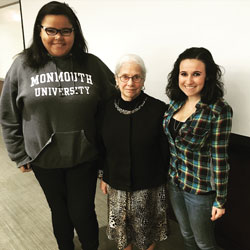Monmouth University had the honor of hosting a meet-and-greet with Deborah Poritz, the former Chief Justice of the New Jersey Supreme Court, on Feb. 21. Justice Poritz is the Public Servant in Residence at the University and was asked to give a lecture for the Political Science department.
Prospective law students watched her speak, regarding her success as the first woman Chief Justice of the New Jersey Supreme Court, how her gender has impacted her decision-making, and the reputation she established for herself in a male-dominated workforce, as well as shedding some light on the evolution of the same-sex marriage case.
Originally from Brooklyn, N.Y., Justice Poritz graduated from James Madison High School in 1954 and then went on to graduate from Brooklyn College in 1958. She chose to continue her education at the University of Pennsylvania Law School. Justice Poritz made New Jersey history when she became the first female Attorney General of New Jersey in 1994, where she served until 1996. Defying the odds yet again, she became the first woman Chief Justice of the New Jersey Supreme Court in 1996, where she served until 2006. Becoming the first woman to hold two of the most prestigious positions in NJ politics, she has inspired thousands of women to break the gender barrier that surrounds politics.
Justice Poritz prepared a speech regarding the gay marriage controversy. She described the importance of language in the interpretation of law at the state and federal level as well as the adjudication of justice at the state and federal level. She discussed and stressed that language was an essential component to her individual decision-making and what she considers establishing a fair course of action to take in such controversial cases.
Dr. Joseph Patten, Chair of the Political Science Department, said, “Her talk was really interesting because it traced the history of same sex marriage rights while revealing the complexities and nuances of judicial decision making. I loved how she let us take a peek inside the mind of a Chief Justice as she reasoned her way to a just decision.”
As Justice Poritz traced the history of the gay marriage controversy through court cases, she emphasized the prevalence of language in the application of the law, especially in regards to a topic that elicits such controversy.
Senior political science student and prospective law school student, Nick Whittaker, said, “Justice Poritz did an outstanding job articulating the judicial process in the context of the Equal Protection Clause. As she demonstrated in her lecture, she is an avid advocate for language. That resonated with me because it confirmed the reason why I want to go to law school. The law is not black or white, rather it is meant to be analyzed and interpreted.”
Justice Poritz emphasized that when it comes to judicial processes and ultimate decision-making, sometimes not all judges will concur on how the law should be approached or applied. She highlighted her need to adhere to language as an imperative form of the interpretation of law, encouraging prospective law students to think outside the box and remain adamant on what they individually believe the law means and stands for.
Professor Bordelon, Professor of Political Science, remarks, “I think that it was important for our students, who may be thinking about going to law school, because they are able to see the blending of judicial interpretation and justice and it was particularly interesting for those students who are curious about how the conference procedure happens and how justices do not necessarily agree on how the law should be applied.”
Whether dealing with federal law or state law, the entire nation looks towards the Constitution for direction. Justice Poritz eloquently expressed her opinion on what makes law transformative and informative at the same time. She provided immense insight into the world of judicial decision-making and judicial processes. Her impact resonated with the student’s, whether they wished to pursue law school or not.
PHOTO COURTESY of Malllory Inselberg




